zepf-dental.com
Extraction
12.300.08
Extractor
acc. to Dr. med., med. dent. Benno Syfrig
Extraction System
acc. to Dr. med., med. dent. Benno Syfrig
Pursuing logically the quest of gentle extraction, Medizintechnik GmbH has developed a new, patented (Pat. No. CH 696 458) extraction system in close collaboration with Benno Syfrig Dr. med., med. dent from Switzerland. You will find further information, application examples and the user forum at: www.benex-dent.com


Extraction

1
Longitudinal extraction with step by step:
Pivot tooth extracted due to root fracture

2
Longitudinal extraction with step by step:
Axial removal

Picture 3
Longitudinal extraction with step by step:
Soft and hard tissues preserved
Extraction System
acc. to Dr. med., med. dent. Benno Syfrig
Polygon of forces, conventional: Pressure on the alveolar wall by forceps or root elevator
Polygon of forces with : Purely axial traction
In modern dental treatment, implantology following extraction is increasingly favoured. Consistent with the principle of minimal invasion, conserving soft and hard tissue structures is a must. Starting with extraction. The modified guarantees a gentle and simple extraction of roots in the whole mouth. It is nearly impossible to harm the soft tissue and the surrounding bone. Due to the longitudinal extraction, is an optimal basis for direct implantation. It is also a valuable help for retarded implantation after the extraction with the system. Studies made after the use of prove that the reossification of the extraction alveole is advancing optimally. This is a great advantage for the retarded implantation.
The new is now available in a washbasket complying with the RKI guidelines. That way, the requirements of optimal cleanability and sterilization were taken into account. You will find further information, application examples and the user forum at: www.benex-dent.com

Picture 4
Longitudinal extraction with step by step:
Soft tissue, 12 weeks after extraction

Picture 5
Longitudinal extraction with step by step:
Alveolar ridge, 12 weeks after extraction


Extraction
Alveolar Ridge Preservation with
What does it mean?
Alveolar Ridge Preservation means the treatment of the dental alveolus after extraction. 3 months after the extraction you find a considerably better ridge relation than with conventional gentle extractions. The finds its successful application in both, private practices and universities. The has achieved an excellent status worldwide as basis for a subsequently successful implantation. The new support for the dismounted System in a washbasket guarantees an optimal cleanability of in a washing machine or in an ultrasonic bath. All components can be fixed safely in the support.
Upon cleaning, the system can be sterilized in assembled condition.

In addition to the components, an optional periotome, an Xtool and an optional Pole Extractor can be placed in the support.

Instrumentary

12.303.00
Basic Kit, consisting of: see in the table of page 05-04/05
12.302.00
Extraction System, consisting of: see in the table of page 05-04/05


Illustration
Extraction
Article Description Order Quantity









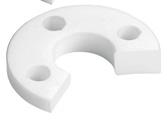


12.302.00
Extraction System, consisting of: Extractor, 2 Pullropes 48 mm, Driver Guide, Screw short 1.6 mm + 2.1 mm, Screw long 1.6 mm + 2.1 mm, 1 Drill ea. for 1.6 mm, 2.1 mm Screws, Quadrant Support, 85.195.10 Washbasket with Lid, 12.302.01 Tray / Rack for
piece
piece Tray / Rack
85.195.00
Washbasket 1/1 with Lid and Press Button Lock
12.303.00
Basic Kit, consisting of: Extractor, 2 Pullropes 48 mm, Driver Guide, Screw short 1.6 mm + 2.1 mm, Screw long 1.6 mm + 2.1 mm, 1 Drill ea. for 1.6 mm + 2.1 mm Screws, Quadrant Support, 85.194.10 Washbasket with Lid
85.194.10
Washbasket 1/2 with Lid and Press Button Lock 12.300.08
piece
piece
piece
piece Extractor
12.300.15 1 piece
Replacement Support Disc, 8 mm (PTFE), optional
12.300.16 1 piece
Support Disc, diagonally right, optional
12.300.17 1 piece
Support Disc, diagonally left, optional
12.300.20 2 pieces Pullrope, 48 mm
Extraction









Diamond coated Drill for Screws (1 ) Ø 1.6 mm 12.300.60 and 12.300.70 12.300.35
pieces
Diamond coated Drill for Screws (1 ) Ø 2.1 mm 12.300.65 and 12.300.75
Driver Guide, short
Screw, Ø 1.6 mm, 10 mm, S = Short (1 )
Screw, Ø 2.1 mm, 10 mm, SF = Short & Fat (1 ) 12.300.70
pieces
Screw, Ø 1.6 mm, 16 mm, L = Long (1 ) 12.300.75
Screw, Ø 2.1 mm, 16 mm, LF = Long & Fat (1 )
Quadrant Support for to bridgeover bigger gaps and for the universal molding
Pole Extractor, optional
Ratchet with demountable handle, optional
Driver Guide FD, optional
Blade for Driver Guide FD, optional





Application of the Extraction System
1. Anaesthesia. Cutting periodontal fibres (Sharpey fibres) in the sulcus by using the Periotome or the
2. Strong, large roots must be loosened / luxated by axial movements within 30 sec., using a slim elevator / twister ( from ). Without using transversal movements. In case of multi-rooted teeth, the roots are divided and extracted separately.
3. Drilling with the diamond coated twist drill should be in the axis and center of the root fragment. It should be approx. 7 mm in the hard tissue, deeper drilling will not be necessary. Drilling is performed with water-cooling. In order to remove drilling chips more easily, an inward and outward movement is recommended for deep drilling.
Recommended rpm:
500 - 700 rpm
3 1 5 4 2 6
4. According to circumstances, the short or long extraction screw with screwing support 12.300.47 is inserted.
5. The extractor is positioned on the adjacent crowns: The opening of the round, revolvable segment plate is adjusted in vestibular direction ensuring a good view of the extraction screw. After the pullrope has been hooked into the extraction screw, it is guided over the reverse roller and fixed to the hook of the extraction slide. Under slight traction – so that the rope does not hang out – the instrument is placed on the adjacent teeth by turning the hand screw. During positioning it is important to see that both the screw and the rope do have the same axial direction.
6. Once the extractor is positioned properly, the extraction is carried out by turning the hand screw. In case of strong, long roots the periodontal fibres have to be pre-stretched for 30 seconds by applying a sub-maximum traction

Extraction

The exclusive design and 25% reduced weight make the -InstrumentLine light as a feather.
The ergonomic handle design enables uniform power transmission during pressing, pulling and rotary movements and is equally suited for both right handed as well as left handed practitioners. The unique tip design adapts exactly to the tooth and is beyond comparison to other instruments.
The smooth handle with circular openings makes the -Instrument-Line extraordinarily easy to be cleaned since there are no more hygiene-critical zones as with instruments with serrated handles.
The ideal handling and tactual sensation is guaranteed.
From design to functionality, this product line answers all your concerns.
The Handle is a registered model of , which has been developed with Dr. Maty.
Extraction
Extracting Forceps


Pattern
All figures from are available in the Pattern
Diamond-Coating
All extracting forceps are available with diamond-coating for better grip. For ordering etc. just add to the item number the letter D
Teflon Disc
The wear-resistant Teflon Disc eliminates wear and tear in the joints and provides a light action at all times.
Grooved Gripping Surfaces

Grooved gripping surfaces provide a secure grip and prevent slipping.








12.073.01Z
The slim, compact design of these Extraction Forceps allows easy accessing molar areas, even when mouth openings are restricted.


12.033.01Z






















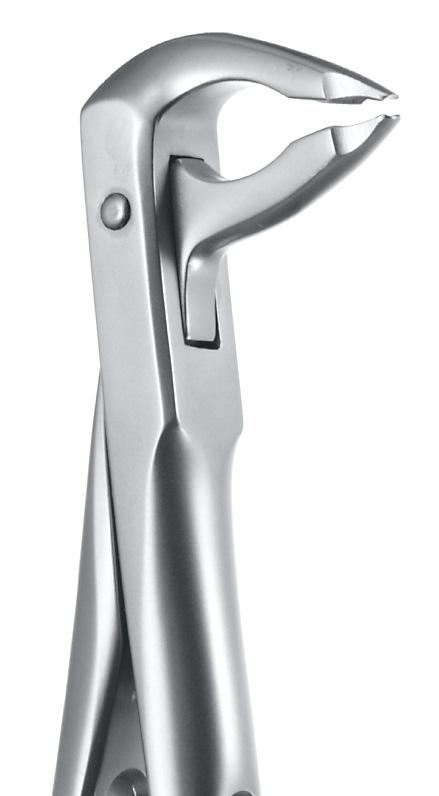



(0) 74 64 / 98 88 0
Secure-Line
Our special Extracting Forceps in our modern Design have tapered jaw tips. Their fine, sharp tips which have been anatomically shaped to match perfectly the teeth and allow to reach deep and large contact areas, which in turn provides better mechanical advantages and a more secure grip. Since these special Extracting Forceps have been designed for performing luxations, they have longitudinal grooves only on their jaws’ gripping surfaces. The easy handling and superior “feel” of all our Lines of Extracting Forceps are of prime importance for this product line!








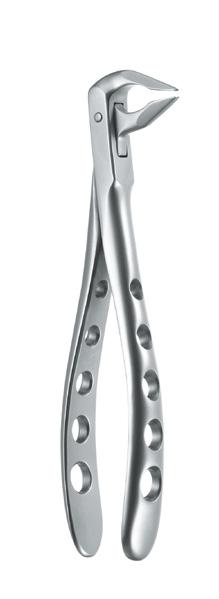


Extraction
Rescue-Line
No reason to panic! These forceps will allow you to carry out any extraction and work more efficiently even under complicated circumstances. If teeth break during extraction, these are the tools you need to rapidly, safely, solve your problems.
These forceps have special all-purpose jaws designed to cover a broad range of applications and have sharp pointed tips that allow separating the tips of roots from surrounding tissue by slightly twisting them and then securely trapping the extracted roots in the gaps between their jaws. The article numbers of extracting forceps with serrated edges are amended by 'ZS'

12.067.90Z



12.045.15ZS
12.045.15ZS

51Z

Special Wisdom Routurier Extracting Forceps
Their angled shape will allow you to reach around obstacles and protect the corners of patients’ mouths whenever their mouth openings are restricted or their jaws have been firmly clamped in position. Their slim compact design allows readily accessing molar areas.


Witzel All-Purpose Root-Splinter Forceps
diamond-tipped
Our special forceps for extracting root splinters from both upper and lower jaw have diamond-tipped jaws for the best possible grip, and are the ideal complement to our Rescue-Line.
If their diamond tips should ever become worn, simply contact our retipping service, who will put new diamond tips on them for a fixed charge.
6.7.8
# 22 1/2 L
# 22 1/2 R

Witzel, 15 cm diamond-tipped










The Kit
12.701.00Z Complete Kit
The Kit consists of:

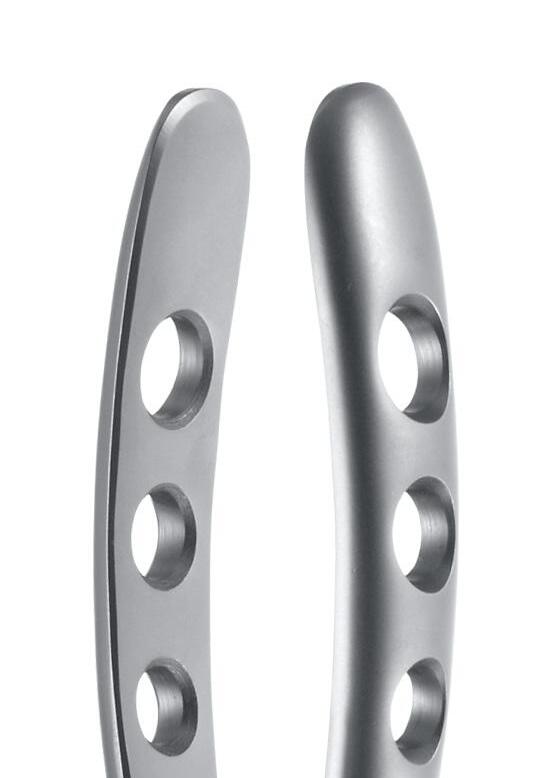
Twist Ex 1 Extracting Forceps for upper front teeth and incisors, deep-grip


Twist Ex 2 Extracting Forceps for upper premolars, deep-grip



Ex 3
Extracting Forceps for lower front teeth, deep-grip

Extraction

12.036.01Z
Ex 4
Extracting Forceps for lower front teeth and incisors, deep-grip


Ex 5
Extracting Forceps for lower molars, deep-grip

Ex 6
Extracting Forceps for upper molars, deep-grip
Extracting Forceps, American Pattern
Diamond Version
All forceps are also available in the diamond version. For ordering etc., just add a D to the article number




















Extracting Forceps, American Pattern








Forceps, American Pattern








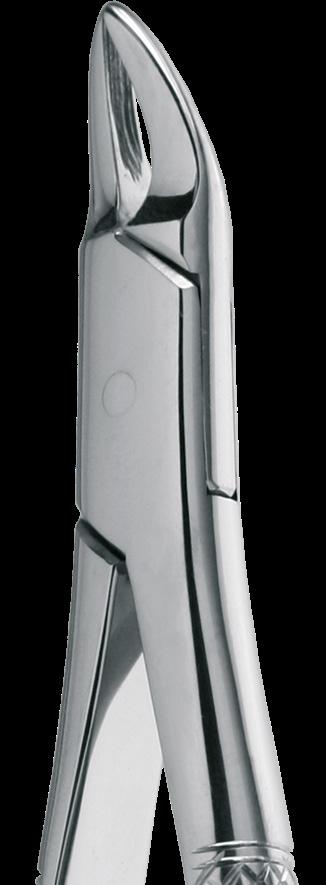








# 150 Cryer 14.150.00 14.150.00D





Extracting Forceps, American Pattern








Extracting Forceps, American Pattern


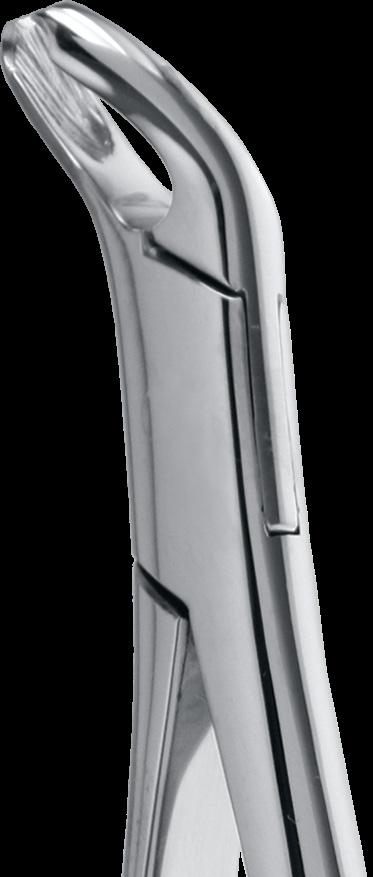



150AB






150AS


Extracting Forceps, American Pattern

10AS








Pedodontic Extracting Forceps
These pedodontic extracting forceps have been designed to be as small as possible in order to avoid frightening younger patients with large, aggressive-looking instruments, thereby providing relaxed working conditions.
Further RoBa-Design Pedodontic Extracting Forceps are illustrated on page 05-32!













zepf-dental.com
Extraction

RoBa-Edition by dentist Beck
Dedicated to the long-standing employees Mr. Horst Roos and Mr. Reinhold Bacher, who worked for Helmut Zepf for more than 50 years since their time as trainee.
The RoBa-Edition completes the innovative advancement of the famous Extracting Forceps. It has been developed under the aspects of a secure and gentle appliance.
The problem of tooth fractures during extraction is considerably reduced due to the innovative geometry of the beaks.
The new ONYX coating makes the impact-resistant surface of these extracting forceps almost indestructible.
Compared with other methods, in ONYX coating the carrier material is applied in a more gentle way, as ONYX coating in comparison to other coatings is performed with significantly less influence of heat.
The surface shows excellent sliding features to reliably counteract contamination. An incrustation of proteins etc. is not possible.
The matt-finished black surface not only prevents reflection of the OT light, but also guarantees an optimal contrast in the OR environment during extraction.




With the patented RoBa-Edition introduces a new generation of extracting forceps. Deduced from the Instruments the RoBa-Edition has been especially developed in consideration of easy and gentle extraction.
The patented RoBa-Edition according to Dentist Beck is the consequential advancement of conventional extracting forceps with the advantages of the tapered deep-grip extracting forceps. The modified beaks according to Dentist Beck fit exactly on the teeth which ensures a maximum grip in the appliance. These new beaks are available for all figures in upper and lower jaw (incisors, premolars, molars and wisdom teeth).
Due to the fact that all teeth show a convex crown contour (upper jaw: labial, buccal, palatal and in lower jaw: labial, buccal, lingual), the beaks have been developed under this anatomical conditions The handle is a protected design from , which was developed in cooperation with Dr. Maty, Germany.
1 The serrated jaws grip onto into the teeth and avoid a “riding” in-between the tooth crown and the inner contour of the beak.
2 Concavely elaborated inner contours of the forceps beak fit in the convex tooth contour. With deep grip in the alveolus on the neck of the tooth or on the crown, the RoBa Edition ensures a parallel and maximum grip in any situation. Root fracture almost can be excluded.
3 The different deeply elaborated inner contours ensure maximal adaptation on the teeth in different actualities. No tilting of the teeth while rotary and / or lifting movement.
4 Tapered outside contour of the beak affords deep grip even subgingival.
Extraction
Black Finish Coating
Design meets functionality.
Users with highest demands will appreciate the elegant, black finish providing the instrument with a non-reflecting, extremely smooth and scratch-resistant surface. The article number is complemented by TI.


Diamond Version
All RoBa-Edition extracting forceps in the classic satin-metallic finished surface are available with diamond coating for a better grip.
The lower part of the Handle is gold-plated. For ordering etc., just add a D to the article number.

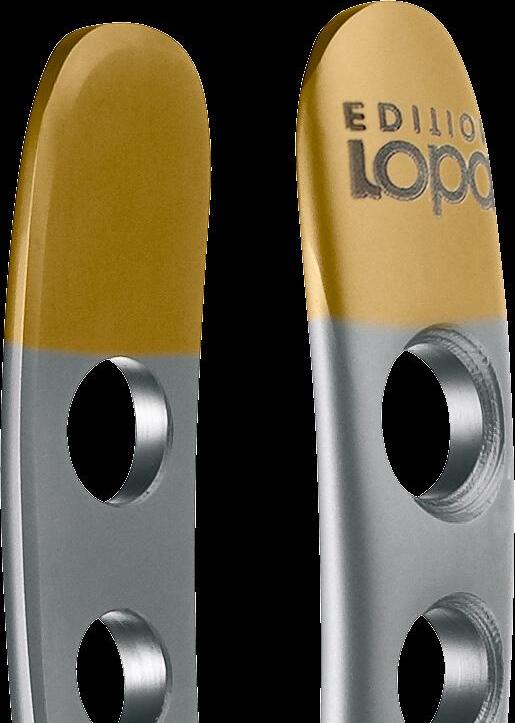
RoBa Extracting Forceps
















Children Forceps RoBa-Edition
Extracting Forceps modif. by Dentist Beck
These deciduous teeth extraction forceps have been designed to be as small as possible in order to avoid frightening younger patients with large, aggressive-looking instruments, thereby providing relaxed working conditions.
The patented Deciduous Teeth RoBa-Edition Forceps according to Dentist Beck are the consequential advancement of conventional extracting forceps with the advantages of the tapered deep-grip extracting forceps. The modified beaks according to Dentist Beck fit exactly onto the teeth which ensures a maximum grip during the appliance.














The wear-resistant Teflon® disc eliminates wear and tear in the joints and provides a light action at all times.

Refreshingly Innovative
The new generation of extracting forceps in the patented Design was designed to meet the special requirements of gentle removal of teeth. To meet these requirements, we composed a programme of 11 extracting forceps figures out of more than 400 existing figures. These were chosen according to anatomy, ergonomics and hygiene.
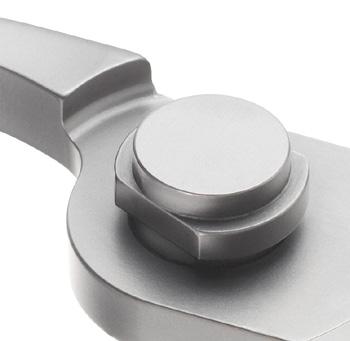













The Forceps offer an excellent anatomic fit and only need enough pressure so they do not slip out of the hand. The forceps guarantee a balanced axial luxation, better periodontal fibre dilatability and increased sense of touch. They reduce traumata of surrounding tissue.
The assimilated handles allow an individual and equal power transmission for left- and right-handed surgeons during pressing, pulling and turning movements.
Due to the smooth handles and the possibility of dismantling, the Forceps can be cleaned extremely well.
So there are no hygiene-critical areas any more like they are known from forceps with conventional lock. Especially with automatic reprocessing in a washtray the disassembly is a great advantage as they need less space.











Extraction

All Advantages on One View:
excellent anatomic adaptation on the tooth surface tapered beaks for less trauma and protection of the alveolar loculus

linear serrated jaws for equal axial luxation
better fibre dilatability and increased sense of touch
optimal cleaning through the demountability of the forceps into two parts (RKI-compliant)
long lasting, patented, high precision joint for radial and axial mechanical load
made out of one piece (5-axis CNC-milling) for ultra high precision
no maintenance of the joint necessary
Focus on the , the standard of tomorrow.

A NEW STANDARD IS DEFINED

Extraction
EXLOG RoBa Edition Extracting Forceps
With the new RoBa Edition introduces a new generation of patented extraction forceps. Two patented extraction forceps are combined into one.
The EXLOG Forceps characterized by the fact that it’s easy to disassemble and the RoBa characterized by its patented jaws.
It made sense to combine both patents as the combination results in a type of forceps which is easier to clean than ever before and additionally offers the dentist a functional extraction tool which leaves no desire unfulfilled.
These patented forceps are the consequent development of conventional forceps with the advantage of tapered and deep grip extraction forceps. The modified jaws exactly match the tooth and guarantee a maximum grip during the application.
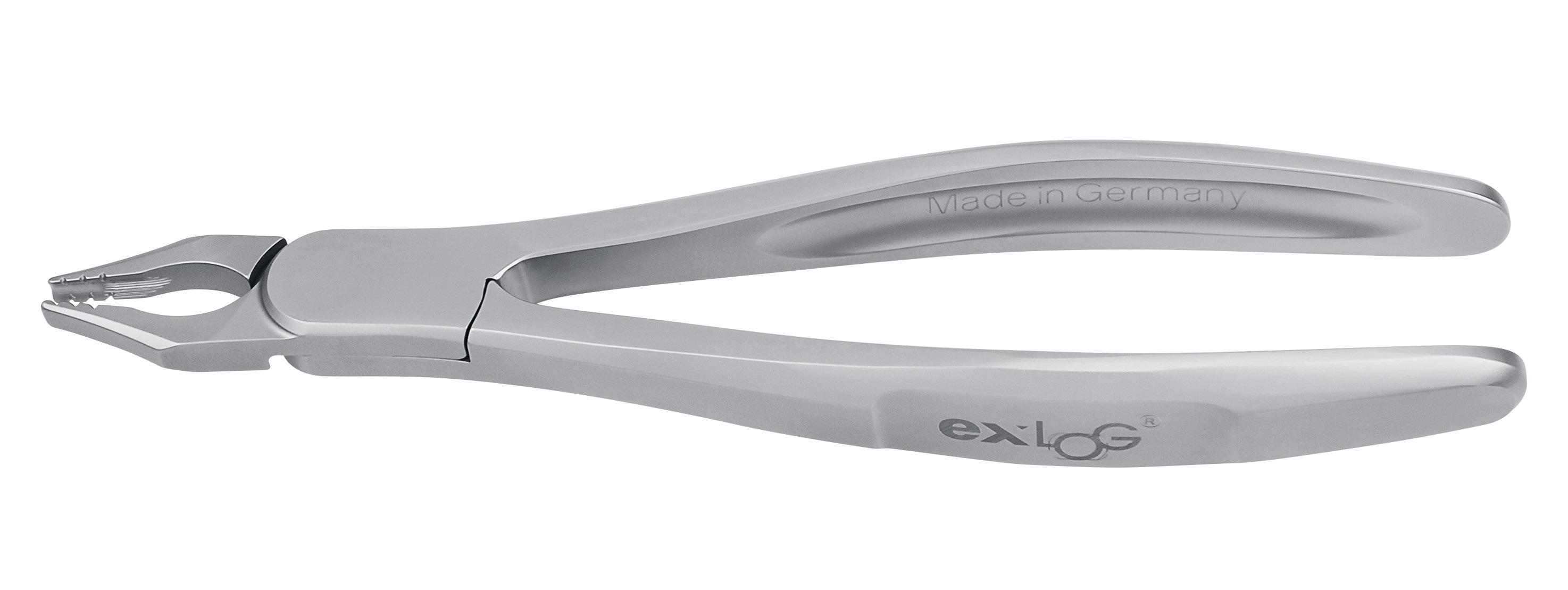
















Extraction
EXLOG RoBa Edition Extracting Forceps
This new development involves all figures for maxilla and mandible (incisors, premolars, molars and wisdom teeth).
As every tooth shows a convex crown shape (maxilla: labial, buccal, palatal – in the mandible: labial, buccal, lingual), the jaw was developed according to these anatomical conditions.
excellent anatomical adaption on the neck of the tooth surface tapered jaws for less traumatization and for conservation of the alveolus
better fibre dilatability and increased sense of touch
optimal cleaning due to the possibility to disassemble the forceps into two pieces (RKI compliant)
long life time, patented, high precision joint for radial and axial pressure produced from one piece (5-axis CNC milling) and therefore ultra precise
no maintenance of the joint

The following problems might occur if the extraction forceps are not suitable:
root fracture
crown fracture
damage of the soft tissue caused by bruising damage of the alveolar ridge and the buccal bone lamella

Advantages of deep-grip extraction forceps:
due to the specially shaped jaws it is easy to place the forceps subgingivally directly on the root (below the gingival margin) parallel contact on the root atraumatic, as the soft tissue is not bruised root fractures are avoided slim jaw design for subgingival grip without bruise of the soft tissues
Instruments




In the illustrations an extraction under use of the Instruments is shown.
IMPORTANT: Complete removal of all inflammable and convective tissue structures.
1 Initial loosening of the desmodontal fibres. Apply the X-Desmo-Tool first approximally then buccally and palatinally (pencil handle).
2 Then progressive luxation with the X-Luxa-Tool (first narrow then wide). Ideal positions: Approximal (mesial or distal) to the tooth which should be extracted!
3 Complete luxation of an upper right molar with support of a wide X-LuxaTool. Gentle extraction without root fractures!
4 Inspection of the empty tooth socket and curettage with support of the X-Spoon.

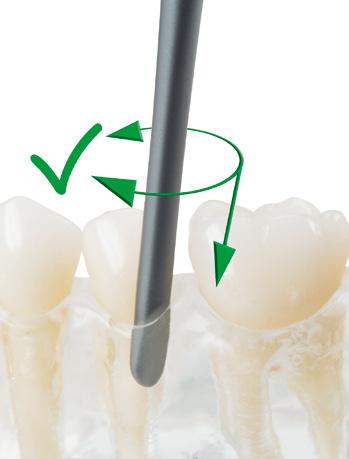












Extraction
Instruments
DBGM acc. to Dr. Detlef Hildebrand
The implantology with immediate insertion after the tooth extraction is more and more a focus of interest in modern dentistry. It appears to be more than necessary to protect soft and hard tissue structures already during the extraction phase and to follow the principles of minimal invasiveness. Here is an ideal complement for this:
The Instruments! In contrast to existing instruments this clearly arranged and universal Xtool Set supports you during the gentle and uncomplicated extraction of teeth which cannot be preserved.
Modern therapy methods require modern instruments!
Color coding for clear handling.
Universal and complete extraction instruments in one tray.
Ergonomic handle design (pencildesign) prevents unintended slipping during usage.
Direct and controlled power transmission to prevent tooth and root fractures.
Non-traumatic tooth extraction without injuring surrounding structures.
Luxa-Tool, straight, 2.5 mm, for front teeth and upper jaw, green metallic
Black Finish Coating
Design meets functionality. Users with highest demands will appreciate the elegant, black finish providing the instrument with a non-reflecting, extremely smooth and scratch-resistant surface. The article number is complemented by TI
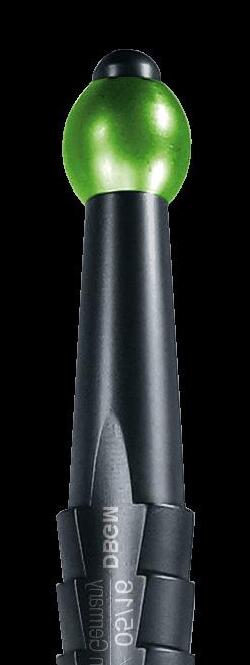

Luxa-Tool, straight, 4.5 mm, for front teeth and upper jaw, green metallic

Luxa-Tool, curved, 2.5 mm, for lower jaw, blue metallic

Luxa-Tool, curved, 4.5 mm, for lower jaw, blue metallicDesmo-Tool, straight, 4.0 mm, for initial loosening of the desmodontal fibres, yellow metallic



Luxa-Tool, straight, 3.0 mm, green metallic

Luxa-Tool, curved, 3.0 mm, blue metallic



Approximal Root Elevator, curved, 2.5 mm, # 77RS, mesial elevator, purple metallicApproximal Root Elevator, curved, 4.5 mm, # 77L, distal elevator, yellow metallicApproximal Root Elevator, curved, 4.5 mm, # 77RL, mesial elevator, yellow metallicSyndesmotome, curved, 4.0 mm, for distal access, purple metallic





Syndesmotome, curved, 4.0 mm, for mesial access, purple metallic


Syndesmotome, curved left, 4.0 mm, for lingual / buccal luxation, yellow metallic
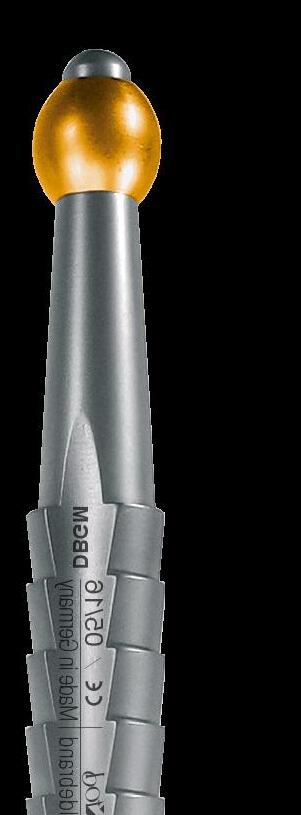


Syndesmotome, curved right, 4.0 mm, for lingual / buccal luxation, yellow metallic
Apical Desmotome, mesial bending, 3.0 mm, for apical access to the deep-lying root stump, brown metallicApical Elevator, mesial bending, 2.5 mm, for apical access to the deep-lying root stump, brown metallic


Separator, straight, 4.0 mm, for the luxation of separated roots, purple metallic

Extraction

H-Tool Set
acc. to Dr. Hildebrand
The new H-Tools developed by Dr. Hildebrand are a continuation of the successful X-Tool concept.
The instrument tips are very flat and sharp pointed.
The instruments are inserted along the root axis and the alveolar cavity is widened by advancing the H-Tool apically along the root of the tooth to be extracted with gentle hammer blows.
The light ferrozell hammer with a diameter of 35 mm enables work to be carried out safely.
Thanks to the extremely light construction, this hammer produces a far less unpleasant feeling in the patient than using a hammer with hard plastic inserts or in the worst case with a metal head.
17.009.00
H-Tool Set
acc. to Dr. Hildebrand




Extraction
Content: H-Tool Set


Article Description
H-Tool Set acc. to Dr. Hildebrand organized in a washbasket, including a Ferrozell hammer and H-Tools, consisting of: Complete set
17.009.00
piece
41.503.01
Hammer, Ferrozell head Ø 35 mm, 100 g, total weight 180 g, 250 mm long, fitting washbasket
17.009.01
H-Tool # 1, straight, tip 3.5 mm, green ball
17.009.02
H-Tool # 2, straight, tip 2.5 mm, green ball
17.009.05
H-Tool # 5, straight, tip 3.0 mm, gold colored ball




piece
piece
piece
85.195.00
Washbasket 1/1 as rack for the remaining components 1 piece
pieces
85.181.04
Profile, high, universal 130 mm / for 8 instruments
85.181.05
Profile, high, universal 81 mm / for 5 instruments
Extraction
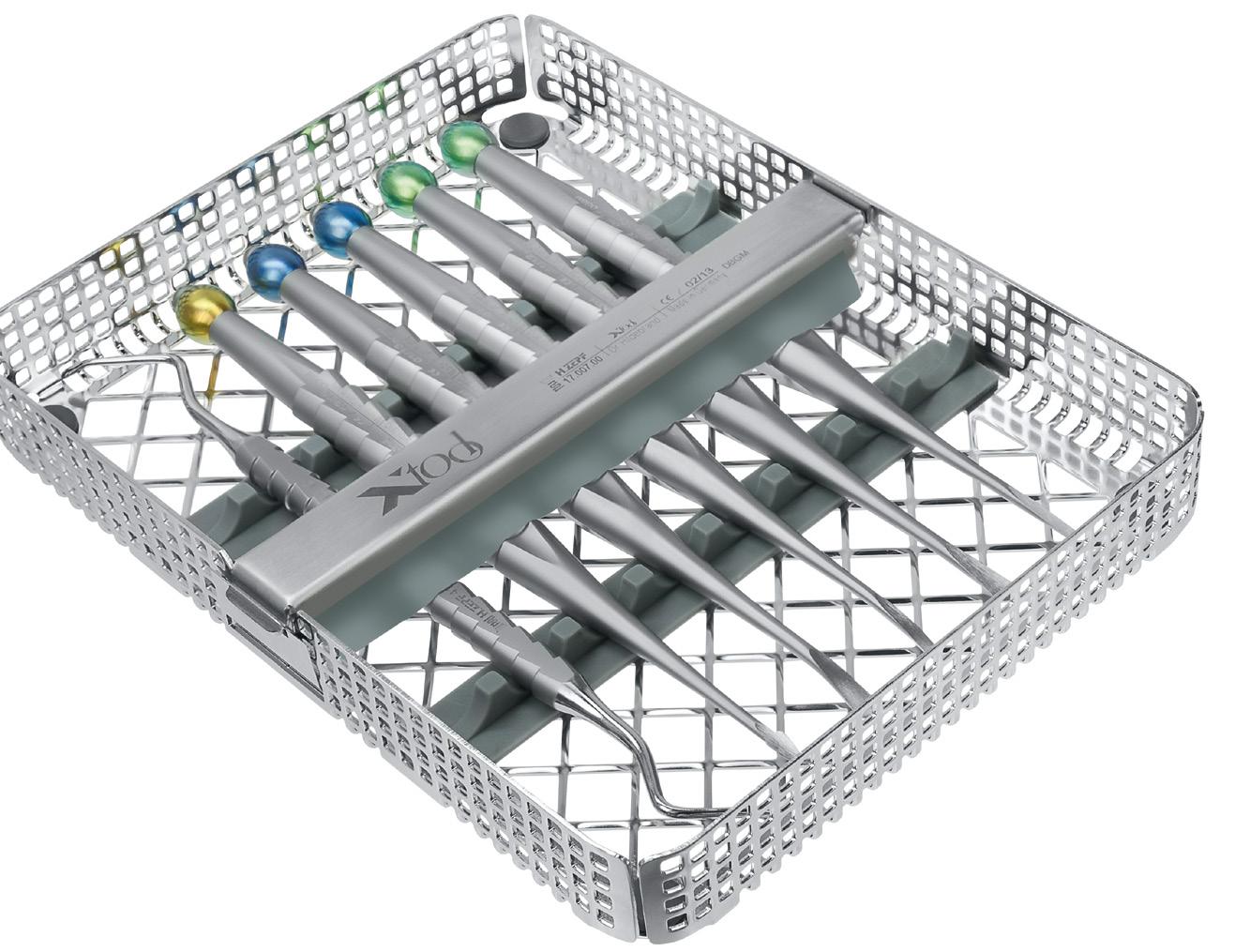
X-Desmo-Tool (yellow):
17.007.00
Complete Set consisting of 17.007.01 - 17.007.05 and 41.855.01Z in the washtray
The X-Desmo-Tool easily penetrates into the periodontal gap with its pointed tip and initially loosens the Sharpey’s Fibres. The modified pencil handle and the handy shaft shape offer a depth sensibility like never experienced before without destroying related structures.
X-Luxa-Tool-3 (blue): bent + narrow for tooth loosening
X-Luxa-Tool-1 (green): straight + narrow:
A delicate and controlled power transmission guarantees a specific loosening and luxation of the tooth without any risk of crown or root fractures. Ideal position: approximal (mesial or distal) to the tooth which is to be extracted.
X-Luxa-Tool-2 (green): straight + wide:
Complete, non-traumatic luxation of upper molars (e.g. tooth 16). The ergonomic instrument shape ensures a gentle extraction without tooth fractures or any damage to the alveolar wall.
X-Luxa-Tool-4 (blue): bent + wide: for tooth luxation
Lucas Schaber -Line:
Inspection and curettage of the empty dental alveolus. Complete removal of all inflamed and connective tissue fibres.
- -Tray
DBGM acc. to Dr. Detlef Hildebrand
“Extraction in its most pleasant way”
The - -Tray offers a universal instrument set for medical tooth extraction. The instrumentation includes six different instruments:

FLE -EX Power Periotome


Extraction

While using new materials, we were successful in the development of the Power Periotome, a symbiosis of Power Periotome, Elevator and Xtool. The flexible working tip will enable you to build up a phenomenal pressure for the luxation in a radial direction and a perfect match to the contour of the tooth at the same time without bending. The name stands for the excellent product features united in this instrument.
Power Periotome
The Power Periotomes allow a gentle loosening of ligaments in the sulcus. The handle allows optimal power transmission and controlled luxation.






05-50
Extraction
Ergonomical and heavy
Heavy, ergonomic handle design with exchangeable tips, for optimal access to all quadrants.

26.182.01
P1, straight, Ø 2.5 mm, 2.5 x 17.8 mm

26.182.02
P2, straight, Ø 2.5 mm, 1.7 x 14 mm

26.182.03
P3, angulated, Ø 2.5 mm, 1.7 x 12.5 mm

(0) 74 64 / 98 88 0
26.182.00 Periotome Handle
Approximal Desmotome, # 0, straight, 3 mm, exchangeable, M 4 x 0.5, single-ended
17.045.00
17.045.04 Approximal Desmotome, # 4, distal bending, 3 mm, exchangeable, M 4 x 0.5, single-ended
17.045.05 Approximal Desmotome, # 5, mesial bending, 3 mm, exchangeable, M 4 x 0.5, single-ended
26.182.04
P4, mesial / distal angulated, Ø 2.5 mm, 1.7 x 12.5 mm

41.834.11 Hemingway Sharp Spoon , double-ended, exchangeable, stainless steel, -Line
Extraction
-Line 2 in 1 Periotomes
The 2 in 1 Periotomes acc. to Dr. Karl-Ludwig Ackermann are saving time as they are reducing the annoying exchange of instruments.

26.182.23 Periotome Combination P3/P2 -Line, double-ended, exchangeable inserts
26.182.24 Periotome P4 / straight Sharp Spoon Ø 3.0 mm -Line, double-ended, exchangeable inserts
-Line Periotomes
For the Separation of the Sharpey’s Fibers in the Sulcus
Before the usage of any root elevator or extraction forceps it is necessary to separate the Sharpey‘s Fibers in the sulcus with a periotome in order to do an atraumatic tooth extraction. To do so, the periotome is to be pulled through the sulcus.
The correct application saves the gingiva and the periosteum. The special design in the grip area guarantees a pleasant grip and extremely easy handling.
26.182.11 -Line, exchangeable
26.182.12 -Line, exchangeable
26.182.13 -Line, exchangeable
Extraction
Root Elevators
Root elevators are used for the surgical tooth extractions. They are used to luxate the tooth in the osseous alveolus and to expand the alveolus walls. They are also used to open the gingival sulcus prior to the tooth extraction.
Straight instruments are used in the anterior region and in the maxillary area. Curved root elevators are ideal for the back teeth in the mandible.
The Workmanship
The shafts of Root Elevators are welded onto their hollow handles, and each and every one is checked for leakage at their welded joints. This manufacturing method virtually eliminates the leakage compared to cheap root elevators with pressed-in shafts.

The Handle Versions
Except for the Xtool-Series, the Elevators from mainly differ in their 5 different handle designs such as: 'Bein', 'Carpal', 'Standard', 'Flohr', 'Mini'.
These are handle versions which can be assigned easily due to their letter coding:






Extraction
Modified Root Elevator Beck


Instructions




The elevator works during the luxation step with 5-7 supporting points (Hypomochlion), which avoids slipping through because of the different surfaces around the radius, instead of a common round-edged instrument, which works with 1-2 supporting points only.
This makes the Beck Root Elevator much more effective.

1 Because of the elliptical shape of the instrument tip, it is easy to penetrate the interdental space with this instrument.
2 Due to the shape, by turning the instrument through 180° it is possible to luxate in four directions: 2 x mesially and 2 x distally.
3 Attention! These instruments must not be used as a lever, as shown e.g. in picture 3. Due to the special shape, an over-strengthening of the tip can cause breakage. We cannot be held responsible for damages caused by improper use.
Extraction
Heidbrink Root-Splinter Elevators
All-purpose instruments for gently extracting root splinters.
Straight (without picture):


With serrated edges for a better grip.
Angled:
(M) 17.051.01 (S) 17.052.01 (M) 17.051.02 (S) 17.052.02
-Line Heidbrink Root-Splinter Elevators
The fine working tips of the Heidbrink Root-Splinter Elevators allow the palpation and mobilization even of small root remnants.


Example for serrations:
17.051.03 (S) 17.052.03





Extraction
Root Elevator No. 195
The drop-shaped, blunt working end makes the new Root Elevator No. 195 ideal for the separation and luxation of roots. The tapered working end allows its special use in the molar region in all quadrants. It can also be used for initial loosening of the desmodontal connection.
Due to its geometry and smooth luxation and rotary motion, the root fragment to be removed will be moved very easily in “crestal direction” (in relative terms!). The luxated fragment can therefore be grasped easily with deep-gripping forceps or with Luer bone rongeur forceps.


Lindo-Levien Root Elevators

The LINDO-LEVIEN Root Elevators are pushed into the periodontal gap in apical direction until the serrations will grip on the roots. The root is extracted via a barb effect by straight pulling without leverage.














Original Arkansas Stone For further information, please refer to page 03-33!



Elevators for axial luxation
These elevators for axial luxation have been developed as an alternative to classic elevators. The instrument must not be used as a lever.
Furthermore the gentle removal of the teeth should be reached by axial luxation and cutting the Sharpey’s fibres.







Extraction




Technique for molars



Extraction
Gärtner and Hylin Root Elevators







Apical Root Elevators








Extraction
Revolving Chisel Vienna Pattern





41.541.02WM

41.541.03WM

41.541.04WM
bajonet, 2 mm, # 2 B

41.541.05WM
bajonet, 3 mm, # 3 B

bajonet, 4 mm, # 4 B
bajonet, 5 mm, # 5 B
Root Elevators Cryer and Winter
Claw elevators are ideal to extract molars in the mandible after separation of the roots.






The bend of the working ends, combined with the shortened tips, allows a gentle lifting of the opposite root without contact to the neighboring crown.
The special claw elevators are ideal to luxate roots if an apical access is possible from the neighboring alveolus, e.g. if a root has already been removed and if the empty alveolus can be used as access. It is recommended first to remove the root which is bent less.








